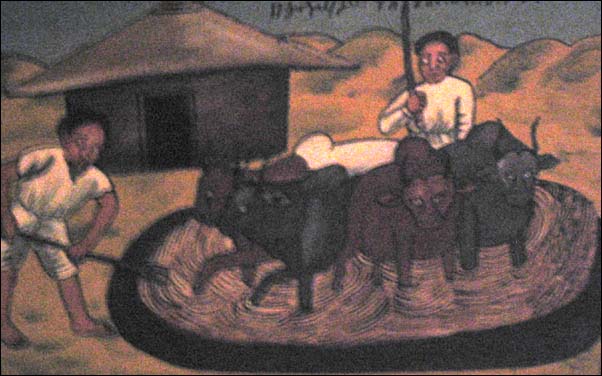

Abyssinia, Who Art Thou?
|
Ethiopian Earth is a 6-part report on natural building in Ethiopia that I authored following two months of research that I conducted in the country between January and April 2006. I have divided this report into sections by region, and have also documented a natural building project that I facilitated at the end of my time there, and a proposal for a much larger project to be built at some point in the future. But first, a few words about how I came to conduct this research, why I embarked on an Ethiopian Odyssey in the first place. My first Ethiopian experience was at an Abyssinian restaurant at least a decade ago in Canada. It was my first foray into African cuisine, and I was hardly the epicurean adventurer I am today. But it was well worth the gastronomical risk. The food was delicious, and the best part of all was that we got to eat it with our hands, from one big communal plate. It was a bonding experience like no other, a first impression that left me with a tactile food fetish. I realized how the fork, only introduced a couple of hundred years ago, has separated us from each other and from the universal life force. But it didn?t have to be this way? The next life-changing Ethiopian experience I had was a few years later, in Israel. My friend Jejaw invited me to his wedding, and almost all of the guests were Habeshan ? Ethiopian-Israelis. Almost all of the music they played was Amharic, which suited me just fine -- I?ve come to prefer African music over European or American music, there?s much more flow, a focus on process over product, instruments of infinite anarchy. But when the grandmas and grandpas started to strut onto the dance floor and bust out the sexy moves, it was then and there that I fell in love with all things Ethiopian. A culture that celebrates its seniors, doesn?t confine them to geriatric gaols, is one that we need to learn from, badly. Back in Canada a few years after that, I took a university course in African history, and learned that Ethiopia was the only country in Africa to have avoided the European colonization of the continent. True, later on in the game, fascist Italy occupied Ethiopia, but only for five years, before they were expelled by Allied forces in the Second World War. But the Italians never put down any significant colonial infrastructure, never fully penetrated the Ethiopian psyche. And the Ethiopians were the only Africans to have developed their own indigenous form of writing ? probably the most beautiful one in the world. I resolved to see the country for myself; I wanted to learn how to be African, and strong, and beautiful, too. I also learned that ?Lucy?, the oldest human skeleton ever unearthed, was found in Ethiopia. For an anti-civilization activist who believes that our greatest glory lies in our distant past, not in our post-modern present or dystopic future, I figure that traveling to Ethiopia would be like traveling back in time, cracking the code to figure our how to live sustainably, as we had for millions of years before the advent of agriculture. I would channel our most ancient Abyssinian ancestors, I would channel the fierce African warriors of the Battle of Adwa, I would cast off my clothing and culture and be reunited with the birth mother of all of humanity. Well? it didn?t exactly turn out the way I?d hoped. I quickly found out that just like every other place in the world, Ethiopia is trying very hard to be as American as possible. Globalization has infected just about every corner of the globe, the Garden of Eden is gone for good. There?s no going back now, only forward. There?s nowhere to run to, nowhere to hide, no escape; we?re all of us trapped here in the belly of the beast. Only only choice is to stand and fight, even if it?s our last stand; I?d rather die on my feet than live on my knees! I was also startled by the realization that all is not alright in Abyssinia, nor was it in the distant past, for that matter. The reason that the European powers had decided to spare Ethiopia the rod of colonization was because it was a Christian country, and had been for a millennium. Well, it so happens that the reason that Ethiopia was already Christian, was because when missionaries first arrived there, they found an Axumite empire that had already subjugated the masses to its rule, a ready-made control mechanism to tap into. Hierarchy was already entrenched in Ethiopian culture, it didn?t need to be forced into submission by white people, it was already bowing down to its own black bosses. Somewhat disappointed, but thankfully a lot more grounded, I spent the rest of my time in Ethiopia learning traditional methods of building shelter and passing on the methods that I?d learned elsewhere. And maybe most importantly, I learned a very fundamental life lesson. Namely, that everywhere in the world, there are a lot of selfish people living in fear, and a few folks with hearts of gold, coming from a place of love. That in every culture there are some negative qualities that we should call out and criticize, and there are some positive qualities that we should actively incorporate. And that in every country, there are some really pretty places that you just have to see, because they?re going to blow your mind wide open. So, by way of introduction to Ethiopian Earth, I give you ? Abyssinia, Who Art Thou? A pictorial study of Abyssinian places and peoples, circa 2006. I am especially thankful to Anthoula, for having me as an honoured guest these last two months, and enabling me to carry out this important research, and to Tesfaye, and Desta, and Bacho, and Cababush, and especially to Hillina, without whom it may have been possible, but not remotely as pleasurable. Thank you teaching me Ethiopia, and making me more human. Lots and lots of love from Amoria =)
|
